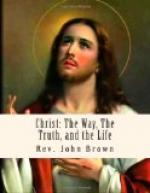11. When they do not profit indeed, let them beware of quarrelling with Christ, or of blaming him in any manner of way; but let them lay the blame of their shortcoming on themselves, for not making more use of him by faith and single dependence upon him. It is true, none will be so bold as in words to quarrel with or blame him; yet the heart is deceitful and tacitly may raise and foment such thoughts of him and his dispensations, as can pass under no other notion than a quarrelling with him. Now these would be guarded against.
12. Beware of urging for, or expecting immediate revelation, or extraordinary manifestations. For we should not tempt the Lord, nor set limits to him, neither should we prescribe means and ways to him,—we must be satisfied with the ordinary means which he hath appointed, and wait at wisdom’s doors, with our ears nailed to his posts.
13. Whatever point of truth they learn, or whatever measure of knowledge they get, they would do well to give that back again to Christ, to keep for them against a time of need; and wait on him for grace to improve it for his glory.
14. Let them beware of minding things too high, Psalm cxxxi. 1. It is better to fear, and to stand in awe, and to seek to lay the foundations well, to get the saving knowledge of things necessary to salvation. This will yield most peace and satisfaction.
CHAPTER XIV.
HOW TO MAKE USE OF CHRIST, AS TRUTH, FOR COMFORT, WHEN TRUTH IS OPPRESSED AND BORN DOWN.
There is another difficulty, wherein believing souls will stand in need of Christ, as the truth, to help them; and that is, when his work is overturned, his cause borne down, truth condemned, and enemies, in their opposition to his work, prospering in all their wicked attempts. This is a very trying dispensation, as we see it was to the holy penman of Psalm lxxiii. for it made him to stagger, so that his feet were almost gone, and his steps had well nigh slipt; yea he was almost repenting of his being a godly person, saying, ver. 13, “Verily I have cleansed my heart in vain, and washed my hands in innocency.” It was something like this, which made Jeremiah say, chap. viii. 18, “When I would comfort myself against sorrow, my heart is faint in me.” The harvest was past, and the summer was ended, and yet they were not saved, ver. 20; and they looked for peace, but no good came, and for a time of health, but behold trouble, ver. 15—and this was fainting and vexatious. And what made Baruch, Jeremiah’s faithful companion in tribulation, say, “Woe is me now! for the Lord hath added grief to my sorrow; I fainted in my sighing, and I find no rest,” Jer. xlv. 3, but this, that all things were turning upside down. God was breaking down that, which he had built; and plucking up that which he had planted. Tribulation and suffering for a good cause, is even fainting to some; as the Apostle hinteth, Ephes. iii. 13, when he says, wherefore, “I desire that ye faint not at my tribulation for you.” And that which evinceth the danger of this dispensation, is the fainting and backsliding of many, in such a time of trial, as sad experience too often cleareth.




